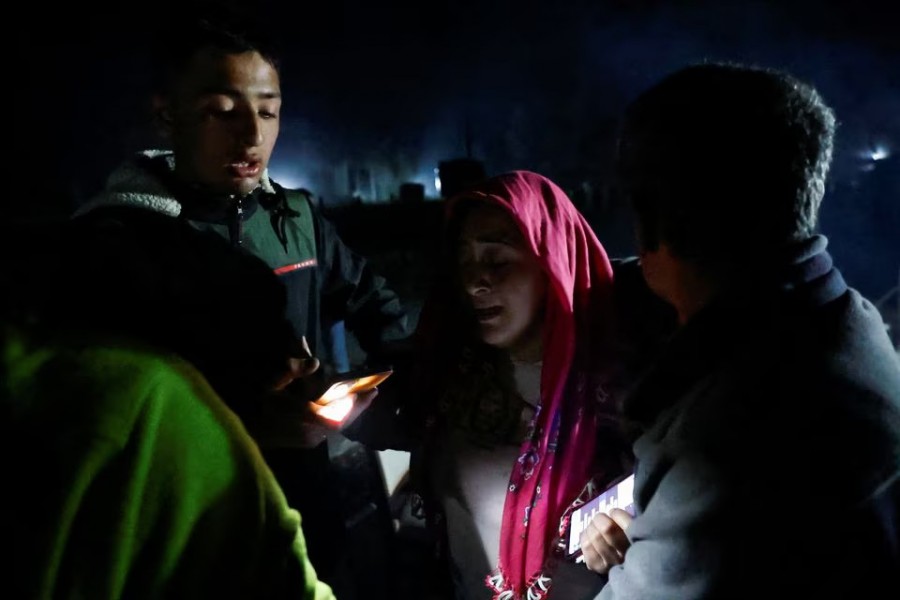Six people were killed in an earthquake which struck the border region of Turkey and Syria, CNN Turk reported on Tuesday, two weeks after a larger quake killed more than 47,000 people and damaged or destroyed hundreds of thousands of homes.
Monday's quake, this time with a magnitude of 6.4, was centred near the southern Turkish city of Antakya and was felt in Syria, Egypt and Lebanon. It struck at a depth of 10 km (6.2 miles), the European Mediterranean Seismological Centre (EMSC) said.
CNN Turk showed a rescue team climbing a ladder to enter one building where some people had been trapped after the latest tremor. It said the quake struck while people were in the already damaged building to retrieve possessions before it was demolished.
Turkish Health Minister Fahrettin Koca said 294 people were injured in Monday evening's earthquake, with 18 seriously hurt and transported to hospitals in Adana and Dortyol.
Patients were evacuated from some health facilities that had remained in operation after the massive tremors two weeks ago, as cracks had emerged in the buildings, Koca said on Twitter.
In Samandag, where the country's Disaster and Emergency Management Authority AFAD had reported one person dead on Monday, residents said more buildings collapsed but most of the town had already fled after the initial earthquakes. Mounds of debris and discarded furniture lined the dark, abandoned streets.
Muna Al Omar said she was in a tent in a park in central Antakya when the ground started heaving again.
"I thought the earth was going to split open under my feet," she said on Monday, crying as she held her 7-year-old son in her arms.
US Secretary of State Antony Blinken said on a visit to Turkey on Monday that Washington would help "for as long as it takes" as rescue operations in the wake of the Feb. 6 earthquake and its aftershocks wound down, and the focus turned to toward shelter and reconstruction work.
The death toll from the quakes two weeks ago rose to 41,156 in Turkey, AFAD said on Monday, and it was expected to climb further, with 385,000 apartments known to have been destroyed or seriously damaged and many people still missing.
President Tayyip Erdogan said construction work on nearly 200,000 apartments in 11 earthquake-hit provinces of Turkey would begin next month.
Total US humanitarian assistance to support the earthquake response in Turkey and Syria has reached $185 million, the US State Department said.
Among the survivors of the earthquakes are about 356,000 pregnant women who urgently need access to health services, the UN sexual and reproductive health agency has said.
They include 226,000 women in Turkey and 130,000 in Syria, about 38,800 of whom will deliver in the next month. Many of them were sheltering in camps or exposed to freezing temperatures and struggling to get food or clean water.
SYRIA AID
In Syria, already shattered by more than a decade of civil war, most deaths have been in the northwest, where the United Nations said 4,525 people were killed. The area is controlled by insurgents at war with forces loyal to President Bashar al-Assad, complicating aid efforts.
Syrian officials say 1,414 people were killed in areas under the control of Assad's government.
Medical charity Medecins Sans Frontieres (MSF) said a convoy of 14 of its trucks had entered northwestern Syria from Turkey on Sunday to assist in rescue operations.
The World Food Programme has also been pressuring authorities in that region to stop blocking access for aid from Syrian government-controlled areas.
As of Monday morning, 197 trucks loaded with UN humanitarian aid had entered northwest Syria through two border crossings, a spokesperson for the UN Office for the Coordination of Humanitarian Affairs said.
Thousands of Syrian refugees in Turkey have returned to their homes in northwest Syria to get in touch with relatives affected by the devastation.
At the Turkish Cilvegozu border crossing, hundreds of Syrians lined up starting early on Monday to cross.
Mustafa Hannan, who dropped off his pregnant wife and 3-year-old son, said he saw about 350 people waiting.
The 27-year-old car electrician said his family was leaving for a few months after their home in Antakya collapsed, taking up a pledge by authorities allowing them to spend up to six months in Syria without losing the chance to return to Turkey.
"I'm worried they won't be allowed back," he said. "We've already been separated from our nation. Are we going to be separated from our families now too? If I rebuild here but they can't return, my life will be lost."


